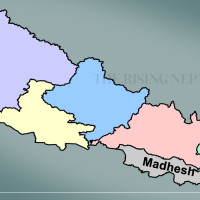- Tuesday, 1 April 2025
Municipality initiates wetland conservation efforts
By Bhaktibilash Pokharel,Gaighat, Mar. 30: The rising encroachment on wetland areas in Triyuga Valley of Udayapur district and nearby regions has put local biodiversity at risk. In response, Triyuga Municipality has made watershed conservation a top priority.
According to Basanta Kumar Basnet, the Mayor of the municipality, the wetlands have been drying up due to human encroachment, deforestation and climate change.
These wetlands have endangered species like the water birds, sarus cranes and great egrets that rely on these ecosystems. The municipality has allocated funds through a partnership programme to protect these wetlands, Basnet said.
The wetlands stretching from the Triyuga River to the Saptakoshi River have been disappearing and some farmers have started cultivating these areas. Once rich wetland sites are now dry and barren due to encroachment.
Locals have raised concerns about the declining population of birds and animals in these areas, prompting the municipality to focus on land conservation efforts.
Basnet said that in coordination with various stakeholders, budget allocations have been made this year - as in the previous year - to continue conservation efforts in wetlands such as Rupni wetland in Ward No. 1, Parewa Khop wetland in Mainaha, Jutpani wetland in Ward No. 3 and Banbhoj wetland in Ward No. 4 of the municipality.
Manoj Chaudhary, Chairperson of Ward No. 1, said that rare species like white egrets, sarus cranes, and peacocks, once common in the Triyuga River wetlands, are now rarely seen. “Wetland birds such as watercock, sarus cranes and great egrets have already disappeared. This is the result of human encroachment in the wetlands,” Chaudhary said.
Ghaman Singh Khatri, Chairperson of Ward No. 2, highlighted that the loss of wetland habitats along the riverbanks has disrupted the life cycle of rare birds and animals. “Frogs, fish and various aquatic species used to thrive in these wetlands, which served as their primary food source. With the destruction of wetlands, these species have been displaced,” he said.
Senior citizens in the area recall that the Triyuga River region once had extensive wetlands.
However, the lack of local conservation initiatives has led to the decline of many species dependent on these ecosystems.
Badri Basnet, Chairperson Ward No. 4 stressed that deforestation, human encroachment in the Chure region and soil erosion from the Chure hills have contributed to silt and sand accumulating in local rivers and streams, further damaging the wetlands.
As a result, efforts to improve drainage systems have also begun.
“Human encroachment is the primary reason for the loss of wetlands in this area,” said Tilak Katwal, Chairperson of Ward No. 3.
He added that the municipality has conserved old ponds in the Bagaha Forest area and the historic Champ pond in Motigadha. As a result, despite the ongoing drought, these ponds have retained sufficient water levels.

















